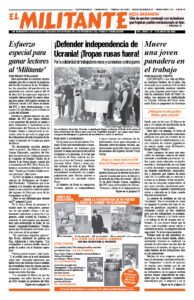TORONTO — A tribute was held here April 17 to Reza Baraheni, a leader of the fight for political and artistic freedom in Iran and one of its most prominent poets, novelists and literary critics. Baraheni died in March at age 86. The Crowned Cannibals: Writings on Repression in Iran is among the best known of his more than 60 books in Farsi and English. (See article in last issue.)
Imprisoned and tortured in 1973 by the U.S.-backed monarchy of Shah Mohammad Reza Pahlavi, Baraheni won his release as the result of an international campaign by prominent artists, writers and political figures.
Baraheni went into exile in the U.S., returning to Iran during the 1979 revolution. Imprisoned again in 1981 by the counterrevolutionary bourgeois-clerical regime that held power by then, Baraheni was freed by another worldwide defense effort. Forced into exile again and settling in Canada in 1997, he continued his writing, teaching, and advocacy of free expression.
The tribute was chaired by Lili Nabavi, a figure in the Iranian-Canadian community and herself a poet. Speakers included Hassan Zerehi, editor of Shahrvand, a North American Farsi weekly; several Iranian artists and writers, including Gholamhossein Babaei Nami and Aydin Aghdashloo; Steve Clark, a leader of the Socialist Workers Party in the U.S. and backer of the campaign to win Baraheni’s freedom in 1973; the writer’s three sons — Oktay (by video), Arsalan and Esfandiar — and his wife, Sanaz Sehhati. His daughter Aleca also attended.
Clark read the following message to Sanaz Sehhati from Mahmoud Sayrafiezadeh, a founder of the Committee for Artistic and Intellectual Freedom in Iran, which organized meetings across the U.S. Baraheni spoke and read his poetry at many of them.
* * *
Reza’s contribution to Farsi and world literature is well known. His contribution in defense of political prisoners of the shah’s regime must be told and retold, as nobody else has done so powerfully as Reza himself, both in prose and in verse, in The Crowned Cannibals.
Close to half a century ago, when the two of you arrived in the U.S., Reza immediately and tirelessly joined the ongoing defense movement and helped strengthen it. With his involvement and leadership, the truth of the struggle of the Iranian people against that repressive regime, and for freedom of expression and the dignity of those incarcerated, was being told by one who had been in prison himself.
Through the activities of the Committee for Artistic and Intellectual Freedom in Iran (CAIFI), with Reza as its honorary chair, more and more writers, youth, and workers joined in the effort and stayed the course to its victorious end. In this, our active collaboration with George Novack was decisive.
I also recall many pleasant visits with rich literary and political conversations. For me and my family, that friendship with you and Reza has been unforgettable.

